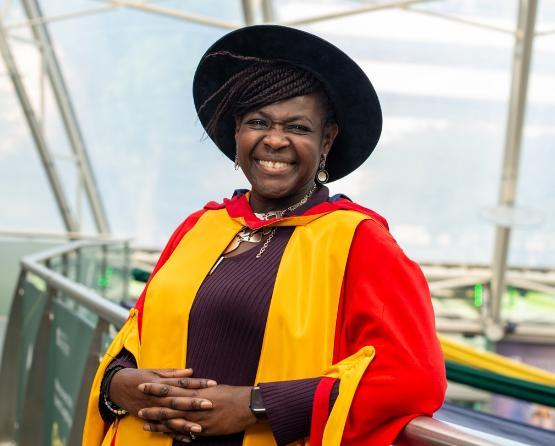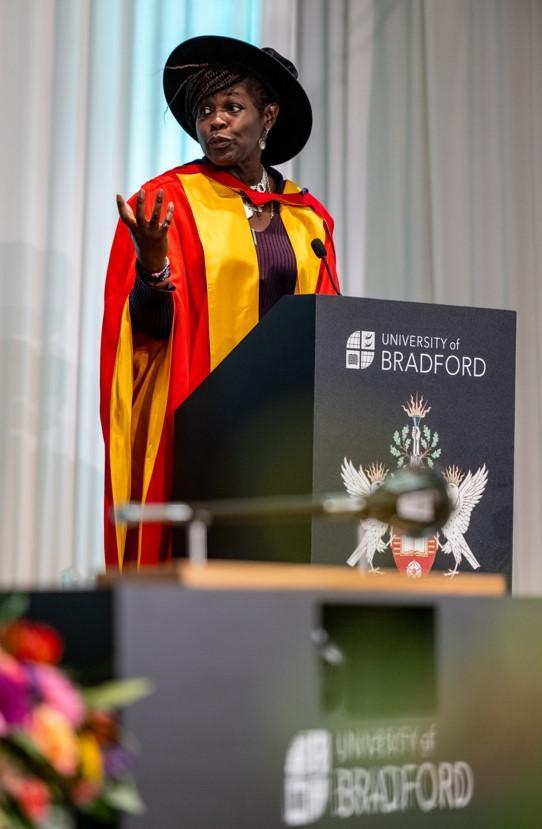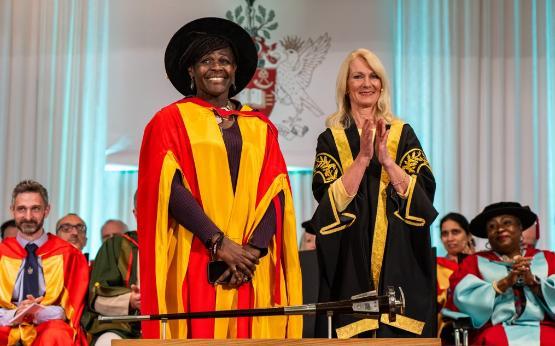Sky at Night presenter tells graduates there are no limits
British space scientist and Sky at Night presented Dame Maggie Aderin-Pocock has spent much of her career reaching for the stars and yesterday, she gave advice on how the next generation can do the same.

Speaking at the University of Bradford, where she was awarded an Honorary Doctor of Science, Dame Maggie said: “Firstly it’s an honour to join this amazing university and secondly, it’s certainly it’s an honour to be celebrating with this... audience coming through today, especially engineering graduates, my heart salutes you. It’s wonderful to see the hard work you’ve put in and to be celebrating here with your families here today and you’ve been supported by fantastic staff at the university and you’re now ready to enter the world and make knowledge work. But thirdly, it is an honour to be here because this university truly champions diversity and inclusion, confronting inequalities and celebrating inclusion wherever it is, which are things that I hold very dear myself.”

Best known as one of the co-presenters of the BBC’s long-running astronomy programme, The Sky at Night, Dame Maggie has a galaxy of accolades to her name.
British space scientist, former president of the British Science Association, Institute of Physics award winner, her image hangs in the National Portrait Gallery ... and she’s even got her own Barbie doll.
Her mantra in bringing her knowledge to the masses is that “you don’t need the brain of a small planet” to understand, participate in and enjoy science. She added: “I didn’t feel like I was going to achieve very much, but I think that my experience shows the true and transformative power of education.”
Born and raised in London, Dame Maggie faced her own challenges, attending 13 different schools and being placed into a remedial class following a diagnosis of dyslexia. It was the children’s cartoon series The Clangers, in which mouse-like creatures live on an alien planet, that first fired her imagination about space travel. Later, she got hooked on Star Trek.
As a child she couldn’t afford to buy a decent telescope, so, instead, she simply made one.
Space author
Through hard work and her family’s support, she would eventually get to outer space via a degree at Imperial College, London, and a PhD in Mechanical Engineering.
“A few years ago, when someone suggested that I might be a role model, I freaked out a little. I thought I couldn’t possibly be a role model, but I think I got that wrong. To be a role model you don’t have to be perfect, we just need to share what we hold a passion for and that is what I think makes the world a better place.”
One of her biggest achievements was working on NASA’s James Webb Space Telescope, the largest telescope in space.
Her television programmes include BBC Two’s Do We Really Need the Moon and Do We Really Need Satellites, as well as Mini Stargazing on children’s channel CBeebies. Other appearances include BBC Radio 4’s Desert Island Discs, BBC quiz show The Wheel and the documentary series Doctor Who Confidential. Dame Maggie is also a bestselling author of books on space.
Dame Maggie has three times been named on the UK Power list of Top Most Influential Black People.
Through her company, Science Innovation Ltd, she introduces both children and adults to the wonders of space.
Over the years, she has given talks to around 500,000 people around the world, including 350,000 children, and in 2020, she was awarded the Institute of Physics William Thomson, Lord Kelvin Medal and Prize for her public engagement in physics.

Achieving the impossible
She added: “Education breaks down barriers, it encourages us to transcend boarders and it enables us to think outside the box, and here at the University of Bradford we do that better than most. So finally, I’d like to mention that together we do the seemingly impossible. I think that’s why we’re so excited to be here today. We are the graduates of 2024, when we work together, we can achieve the impossible.”
To mark International Women’s Day and British Science Week in 2023, when Dame Maggie was presented with her own Barbie doll, she said: “Since falling in love with the idea of space travel as a young girl, I have spent my career trying to show girls how fascinating space science can be.
“I want to inspire the next generation of scientists, and especially girls, and let them know that STEM (Science, technology, engineering and maths) is for them.”
* Additional reporting by Ruby Hullah
